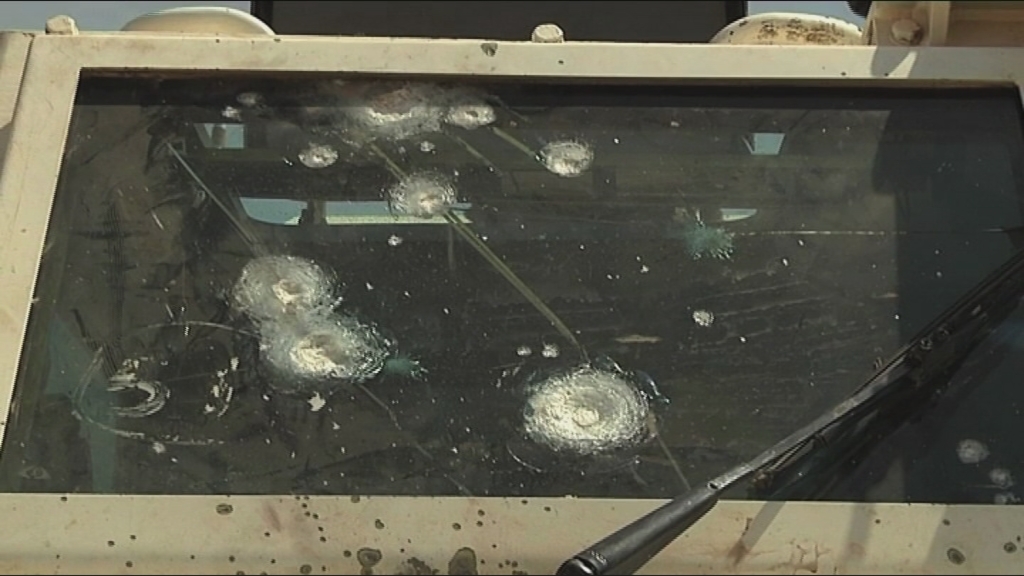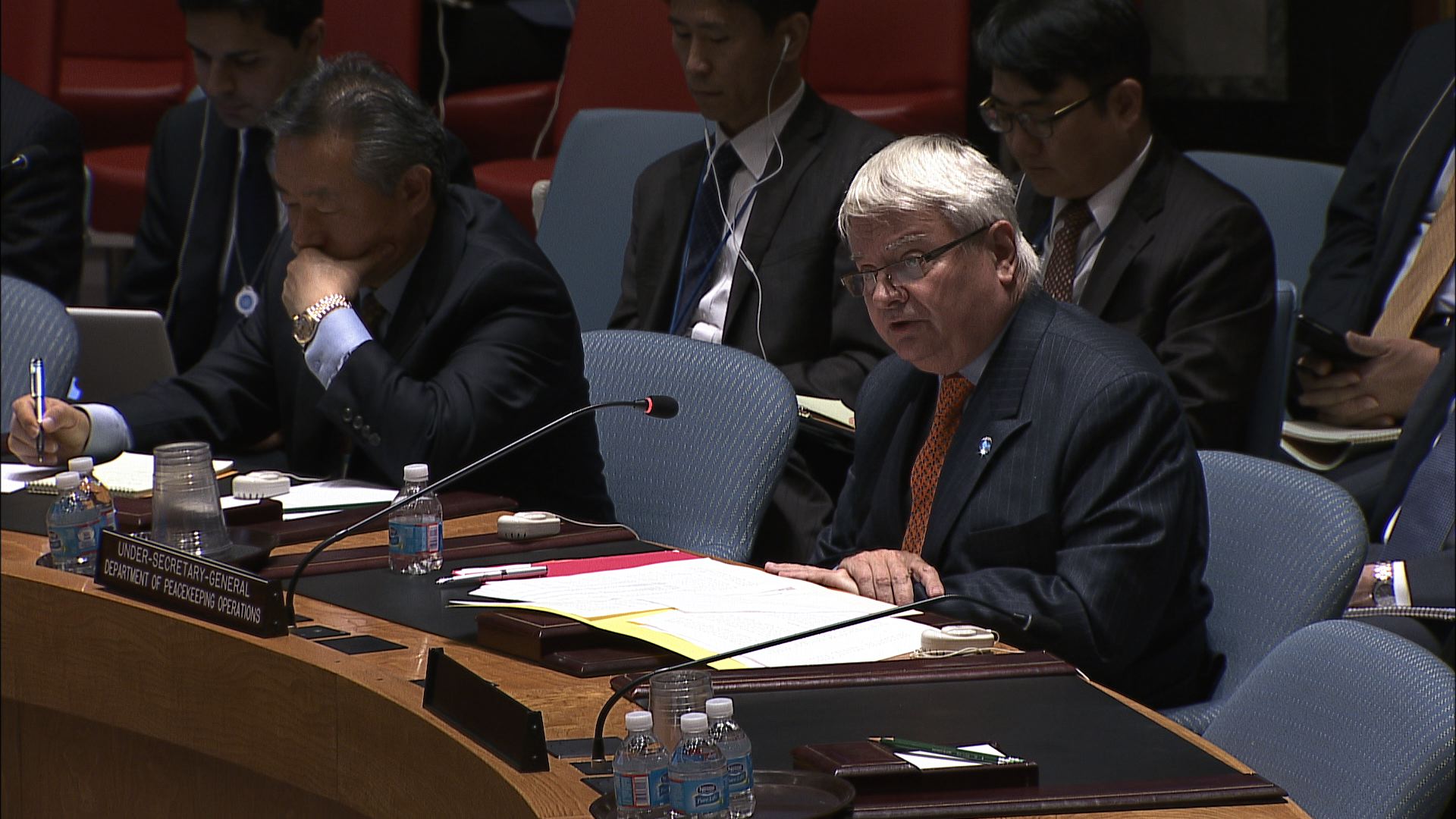Unifeed
UN / SUDAN
STORY: UN / SUDAN
TRT: 2:43
SOURCE: UNIFEED
RESTRICTIONS: NONE
LANGUAGE: ARABIC / ENGLISH / NATS
DATELINE: 17 APRIL 2019, NEW YORK CITY
FILE - NEW YORK CITY
1. Wide shot, UNHQ exterior
17 APRIL 2019, NEW YORK CITY
2. Wide shot, Security Council
3. Wide shot, German State Minister presiding over Security Council
4. Wide shot, Mueller being seated at Security Council table
5. Wide shot, Security Council
6. SOUNDBITE (English) Jeremiah N. Mamabolo, Joint Special Representative, United Nations - African Union Hybrid Operation in Darfur (UNAMID):
“Darfur is not, and cannot, be immune from what is happening at the national level. The incidents of violence in Darfur IDP camps in reaction to the events in Khartoum attest to the fragility of the security situation in Darfur, which had hitherto been increasingly calm and stable, with the exception of the Jebel Marra area. It is my hope that the situation does not deteriorate further and have a negative impact of the UNAMID’s envisaged exit.”
7. Med shot, delegates
8. Wide shot, delegates
9. SOUNDBITE (English) Ursula Mueller, Assistant-Secretary General for Humanitarian Affairs and Deputy Emergency Relief Coordinator, United Nations:
“With increases in costs of medical services ranging from 50 to 100 percent, households are less able to afford healthcare and are more vulnerable to health risks. Shortages of food and high prices also worsen protection risks, as people turn to negative coping mechanisms, and fewer children attend school. Women and the elderly continue to be particularly affected as households are prioritizing food for their children.” (continues under cutaway)
10. Wide shot, delegates
11. Med shot, Peruvian ambassador
12. Wide shot, Security Council
13. SOUNDBITE (Arabic) Yasir Abdelsalam, Chargé d'affaires, Mission of the Republic of Sudan to the United Nations:
“We are vigilant - and we have confidence that members of the Council share the same vigilance – not to take any steps that could have negative repercussions on the situation. You and the entire world have seen the peacefulness of the Sudanese revolution and its civilized path in an effort to achieve the change to which the Sudanese people yearn. If the Sudanese people’s revolution has succeeded in achieving its demand in the past four months, then the entire Sudanese people are able to achieve all their demands, and continue their revolution is a peaceful and civilized manner, in a way that suits the circumstances and challenges of the country.”
14. Zoom out, Security Council
The Joint Special Representative for the United Nations-African Union Hybrid Operation in Darfur (UNAMID) said Darfur “is not, and cannot, be immune from what is happening at the national level” and hoped that the situation “does not deteriorate further and have a negative impact of the UNAMID’s envisaged exit.”
Addressing the Security Council today (17 Apr), the Head of UNAMID Jeremiah Mamabolo said the mission was scheduled to handover the Sector East headquarters in El Daein on 15 April as part of its drawdown plan, however it had since delayed this handover by two weeks pending further clarity as the state’s administration keeps changing. He said the incidents of violence in Darfur displaced camps in reaction to the events in Khartoum “attest to the fragility of the security situation in Darfur, which had hitherto been increasingly calm and stable, with the exception of the Jebel Marra area.” He added, “It is my hope that the situation does not deteriorate further and have a negative impact of the UNAMID’s envisaged exit.”
Speaking about the general situation in Sudan, Mamabolo said General Abdel Fattah Al-Burhan, who has succeeded General Awad Ibn Auf as head of the Military Transitional Council (MTC), announced a number of steps aimed at stabilizing the situation including lifting the daily curfew across the country, releasing political detainees and a ceasefire all over the country. He added that the MTC was replacing high-ranking Government officials who are unpopular with the demonstrators, perhaps in an attempt to gain some trust and confidence.
The UNAMID chief noted that the African Union Peace and Security Council (AUPSC) on 15 April issued a communique calling of the military transitional council to install a transitional civilian authority within 15 days, or face being suspended from participation in all the AU’s activities. He said while there are has been no reaction so far by national stakeholders, the Military Transitional Council was likely to consider the AUPSC statement a setback.
UN Deputy Emergency Relief Coordinator Ursula Mueller said humanitarian needs in Darfur, and other parts of Sudan, were already growing due to the economic crisis well before the latest developments in the country. She said the direct impact on humanitarian operations from the recent political events had so far been limited, and regular operations have continued including major polio and measles vaccination campaigns.
Mueller however stressed that the economic crisis in Sudan has had a significant impact on humanitarian needs and operations, including in Darfur. This includes rapid currency devaluation, rampant inflation, increasing prices for food and medicine, a marked decline in purchasing power and intermittent shortages of daily bread and fuel supplies. She added that shortages of imported commodities have also impacted healthcare and other services.
SOUNDBITE (English) Ursula Mueller, Assistant-Secretary General for Humanitarian Affairs and Deputy Emergency Relief Coordinator, United Nations:
“With increases in costs of medical services ranging from 50 to 100 percent, households are less able to afford healthcare and are more vulnerable to health risks. Shortages of food and high prices also worsen protection risks, as people turn to negative coping mechanisms, and fewer children attend school. Women and the elderly continue to be particularly affected as households are prioritizing food for their children.”
Mueller said the United Nations Central Emergency Response Fund last week allocated USD 26.5 million to assist vulnerable people in areas which have seen some of the largest increases in food insecurity linked to the economic situation but underscored that more support was needed. She reported that humanitarian partners were appealing for USD 1.1 billion to assist 4.4 million of the most vulnerable people, which represents a bit more than half of the overall needs identified in the country.
Yasir Abdelsalam, Chargé d'affaires of the Sudanese mission to the UN, said the events which have been ongoing in Sudan since December 2018 were an internal affair which should not be discussed in the Security Council especially as the exceptional situation the country required utmost caution. He said stakeholders in Sudan should be given the opportunities to continue their deliberations on peaceful transition and democratic change.
The Council was meeting to discuss the situation in Darfur, but many speakers addressed the recent events in the country as a whole.
Abdelsalam said, “We are vigilant - and we have confidence that members of the Council share the same vigilance – not to take any steps that could have negative repercussions on the situation.” He stressed that the “entire world [has] seen the peacefulness of the Sudanese revolution and its civilized path in an effort to achieve the change to which the Sudanese people yearn. If the Sudanese people’s revolution has succeeded in achieving its demand in the past four months, then the entire Sudanese people are able to achieve all their demands, and continue their revolution is a peaceful and civilized manner, in a way that suits the circumstances and challenges of the country.”
Download
There is no media available to download.









